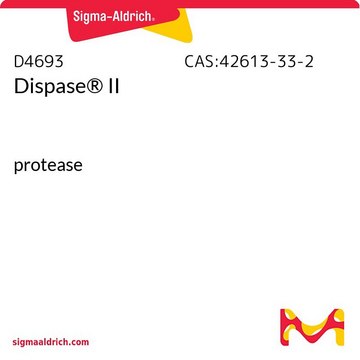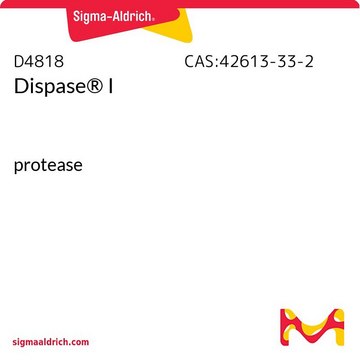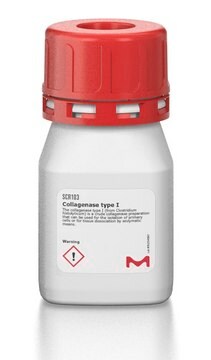B20223
Collagenase - DNase I - Dispase II blend
Tissue dissociation blend, lyophilized powder, suitable for cell culture
Synonyme(s) :
Clostridiopeptidase A, Clostridium histolyticum, DNase I, Deoxyribonuclease I, Deoxyribonucleate 5′-oligonucleotido-hydrolase, Dispase II, Protease from Bacillus polymyxa, collagenase, collagenase blend, enzyme blend, tissue dissociation blend
About This Item
Produits recommandés
Niveau de qualité
Forme
lyophilized powder
Activité spécifique
≥2 units/mL Dispase II
Concentration
0.1 mg/mL (DNase)
1 mg/mL (collagenase)
Technique(s)
cell culture | mammalian: suitable
Conditions d'expédition
dry ice
Température de stockage
-10 to -25°C
Description générale
Actions biochimiques/physiologiques
Notes préparatoires
Mention d'avertissement
Danger
Mentions de danger
Conseils de prudence
Classification des risques
Eye Irrit. 2 - Resp. Sens. 1 - Skin Irrit. 2 - STOT SE 3
Organes cibles
Respiratory system
Code de la classe de stockage
11 - Combustible Solids
Classe de danger pour l'eau (WGK)
WGK 3
Certificats d'analyse (COA)
Recherchez un Certificats d'analyse (COA) en saisissant le numéro de lot du produit. Les numéros de lot figurent sur l'étiquette du produit après les mots "Lot" ou "Batch".
Déjà en possession de ce produit ?
Retrouvez la documentation relative aux produits que vous avez récemment achetés dans la Bibliothèque de documents.
Notre équipe de scientifiques dispose d'une expérience dans tous les secteurs de la recherche, notamment en sciences de la vie, science des matériaux, synthèse chimique, chromatographie, analyse et dans de nombreux autres domaines..
Contacter notre Service technique










